Interstate 20 winds its way gently across the southern half of the United States.
Springing to life at the Mexican border town of Odessa, Texas, it 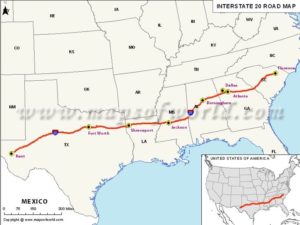 meanders its way eastward through most of the keystone cities of the region: Dallas, Fort Worth, Shreveport, Vicksburg, and Jackson, Mississippi, all great capitals of the Southern United States.
meanders its way eastward through most of the keystone cities of the region: Dallas, Fort Worth, Shreveport, Vicksburg, and Jackson, Mississippi, all great capitals of the Southern United States.
The roadway then turns north, rising through Tuscaloosa and Birmingham’s cotton and tobacco fields.
From there, it cuts neatly through the heartland of the former Confederate States of Georgia and South Carolina, ending its eastern journey in Florence, Georgia.
There the freeway splits, one fork going east to Charleston and Fort Sumter on the Atlantic Coast and another South to Savannah, shadowing that great river of the same name.
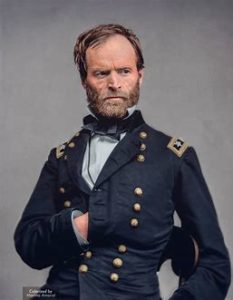 This almost uninterrupted line of cities and towns, which formed the backbone of the South’s resistance during the Civil War, made it easy for General William Sherman to follow, almost precisely, on his ruthless march to the sea.
This almost uninterrupted line of cities and towns, which formed the backbone of the South’s resistance during the Civil War, made it easy for General William Sherman to follow, almost precisely, on his ruthless march to the sea.
When he burned, pillaged, and destroyed much of what remained of the southern resistance during the last war fought on American soil.
During this great conflict, which almost destroyed the embryonic United States of America, that prominence first came to the sleepy, tranquil town of Augusta, Georgia.
Situated strategically on the banks of the Savannah River, far from the critical industrial hubs of Atlanta and Charleston, it became one of the important manufacturing centers of the Confederate cause.
The munitions factory constructed in Augusta during this era supplied almost 100% of the ammunition and gunpowder used by the southern cause during the Civil War.
For this reason, General Sherman ensured that Augusta was on his hit list as he made his ruthless march to the sea.
All that remains from that factory is the smokestack that still stands in downtown Augusta as a lasting testimony to man’s destructive follies.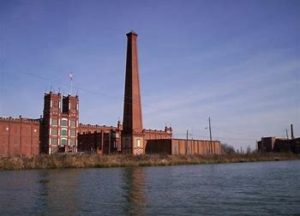
At the end of this horrific era in our nation’s history, Augusta returned to a small, peaceful, indescribable southern town, where it remained for nearly eighty years, best known for its hospitable climate that rich folks from Atlanta and Charleston could escape in the cold and wet months of the southern winters.
For these reasons, Atlanta native Bobby Jones, the most celebrated golfer of his generation, decided to build a country club on a former plant nursery, which later would become one of the most famous golf courses in the world.
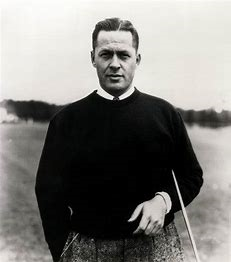 And it was on this golf course that Bobby Jones and the late Clifford Roberts would promote a tournament that would become known as the Masters.
And it was on this golf course that Bobby Jones and the late Clifford Roberts would promote a tournament that would become known as the Masters.
For fifty-one weeks of the year, Augusta, Georgia, remains the sleepy diminutive southern town it has always been.
Still, for one glorious week, in early April, the road to Augusta suddenly becomes an odyssey and a must-traveled road for thousands and thousands of golf enthusiasts.
Those that make the pilgrimage are treated to one of the greatest sporting spectacles of our time.
The Masters, the first major tournament on the PGA Tour’s annual schedule, has become a rite of spring for most sports-minded fans.
More than a golf tournament, it is eagerly anticipated and devotedly followed.
The Master’s has always been about tradition.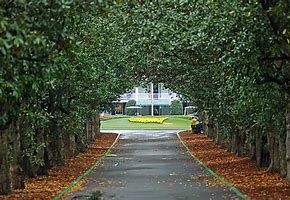
From the perfect condition of the golf course with spectator-friendly mounds on every hole, inexpensive food items for patrons on the golf course, invitations to top amateurs and foreign players, azaleas and dogwoods blooming in perfect harmony, the par-3 contest, and of course, the awarding of the green jacket, all time-honored, all instantly signifying The Masters.
As the sports announcers and pundits on television proclaim each year, “The Masters is a tradition unlike any other in sports.”
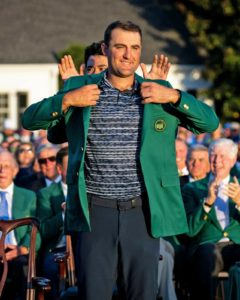 The Major Championships have always measured the greatness in golf, and the Masters is first in line.
The Major Championships have always measured the greatness in golf, and the Masters is first in line.
Many of golf’s greatest players have won the coveted green jacket. Arnold Palmer, Jack Nicklaus, Tiger Woods, Jimmy Demaret, Ben Hogan, Nick Faldo, Gary Player, Sam Snead, Bryon Nelson, Phil Mickelson, Jordan Spieth, and others have all won golf’s most coveted crown along with the perpetual invitation to return to the hallowed grounds of the Augusta National each spring.
For spectators, sponsors, media, and just about everyone else, the Masters has become one of the most coveted tickets in all sports and is near the top of bucket lists of worshipping devotees worldwide.
![]()
![]()
![]()
![]()
![]()
![]()
![]() Walking the emerald, green fairways of the Augusta National, gazing at the stately Georgia pines, watching the best players in the world, and hearing the roars resounding from Amen Corner is a treat worth whatever the journey costs to get there.
Walking the emerald, green fairways of the Augusta National, gazing at the stately Georgia pines, watching the best players in the world, and hearing the roars resounding from Amen Corner is a treat worth whatever the journey costs to get there.![]()
Although tickets to the Masters are among the hardest to obtain for any happening, not just in sports, it is something every sports fan should do at least once in their lifetime.
The road to the Masters is arduous, lengthy, and challenging, not just for golf enthusiasts wishing to attend the Masters.
The qualification process for Touring Professionals is also demanding, but the benefits of winning one of these events become a life-altering achievement.
For corporate America, just about any company in the world would sell its soul to get its name on a Master’s broadcast.
The trip to Augusta and the Master’s Golf Tournament is challenging for just about everybody.
For touring pros, spectators, and sponsors, the passage is long and arduous but supremely rewarding once you arrive and enter the stately grounds of the Augusta National Golf Club.
![]() For all fortunate enough to participate in the wonder of the Masters, whether as a spectator, sponsor, media member, or player, the satisfaction and rewards that come from that participation are glorious, breathtaking, and life-fulfilling.
For all fortunate enough to participate in the wonder of the Masters, whether as a spectator, sponsor, media member, or player, the satisfaction and rewards that come from that participation are glorious, breathtaking, and life-fulfilling.
But, just as every meaningful journey in life starts with a tiny footstep, the path to the Master’s for all who participate begins on Interstate 20, the road to Augusta.

